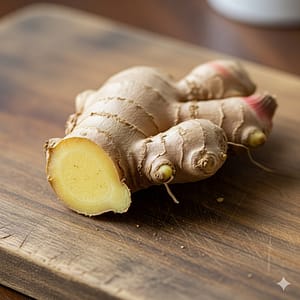- Home
- Ginger Root

I. General Information
A. Scientific Name:
Zingiber officinale
B. Alternative Names:
Adrak, Sheng Jiang, Jengibre
C. Pronunciation:
Jin-jer
II. Sourcing and Origin
A. Source:
Rhizome of the ginger plant
B. Geographic Origin:
Native to Southeast Asia, especially India and China; cultivated worldwide in tropical regions
C. Method of Processing:
Fresh, dried, powdered, or extracted as essential oil
III. Properties and Uses
A. Physical Properties:
Knobby beige root with pungent aroma; yellow interior
B. Chemical Composition:
Gingerols, shogaols, zingiberene, vitamin B6, potassium
C. Primary Uses:
Stimulating root for digestion, circulation, and skincare
D. Key Benefits:
Boosts circulation and warms skin
Reduces inflammation and muscle pain
Supports digestion and nausea relief
Antioxidant and antimicrobial properties
IV. Safety and Considerations
A. Potential Allergies:
Rare; can cause irritation in high concentrations
B. Best Practices for Use:
Use in diluted form for skincare
C. Special Precautions:
May interact with blood thinners
V. Fun & Educational Facts
A. Historical Context:
Highly valued in ancient spice trade routes
B. Did You Know?
Ginger is one of the few foods classified as both food and medicine in Ayurveda
C. DIY Recipe Idea:
Ginger tea, ginger compress, ginger sugar scrub
